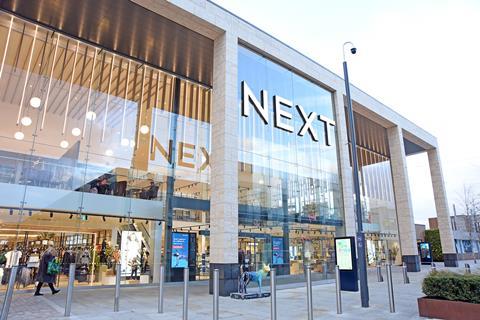After yet another stellar performance from Next, Retail Week looks ahead to the fashion and home group’s “new era” and its plans to continue on an upward trajectory
Today Next reported a 5% rise in profit before tax to reach a record high of £918m, while group sales also jumped 5.9% to £5.8bn.
The fashion and home retailer said it had been a long time since it started a new financial year in a more positive frame of mind and that it is emerging from turbulent years as “a very different company”.

Shore Capital director Clive Black says that, while Next eyeing long-term growth might “make the stock a bit of a yawn,” it is a strong positive trait for the business and those interested in investing.
With three new avenues of growth laid out, described by chief executive Lord Wolfson as a “subtle shift in emphasis”, Retail Week looks at what’s next for the retailer and where its focus lies now.
Overseas ambitions
Next highlighted the growth of its own brand overseas as one of a trio of “distinct, exciting and new avenues of growth”.
Having made strong progress to date, with overseas online sales up 17% last year, the world could well be its oyster.
Next already has a partnership with leading US retailer Nordstrom under its belt and an announcement pending about a new franchise and licensing partner in India, as well as some early-stage conversations ongoing in other Asian territories.
However, Wolfson stressed that such deals all come down to finding the right partners with the right online capabilities.
Wolfson says: “The ability of the brand to grow overseas seems very strong and we think there are opportunities to go further.
“I think it’s important to divide the markets into those that we can service directly, which is Europe and to an extent the Middle East; we just opened our own warehouse there so we can compete with local aggregators.”
As well as the new warehouse, Next said it has achieved overseas success to date by improving its own third-party aggregators, increasing spend on digital marketing and removing “unprofitable products” from its offer.
While the retailer has strong brand awareness in Europe and the Middle East, Wolfson thinks that traction in “long-haul” territories such as South East Asia, the Americas and Australasia has declined.
With work to do to bolster its international success, Next is set to turn the challenges – including the costs involved with serving markets far from home, a lack of exposure to its brand and the rise of local competitors – into new opportunities.
New additions
As well as continuing to diversify its own brand, Wolfson says that developing product ranges under different brands will help the business attract a broader customer base.
“We think there’s opportunity to develop new brands by drawing on our product skills and leveraging infrastructure that we’ve got, both in terms of our UK customers and those overseas,” he says.
“We can do this through our wholly owned brands, like Love & Roses and Friends Like These, our third-party brands like Cath Kidston and Made, or through collaboration via licence agreements with other brands.
“This is where our specialist skills like childrenswear and swimwear allow us to work with other iconic brands to draw on their skills and deliver something neither of us could deliver alone.”
Despite outlining the potential for new additions to its already strong stable and plans to diversify where possible, Wolfson emphasises that the Next own brand “remains the jewel in our crown”.
He adds: ”It’s not that we’re unhappy with where we are, but we do think we can move the brand forward.”
Total Platform’s upward trajectory
With an eye to new brands, Next revealed today that its Total Platform is anticipated to contribute £77m of profit to the group in the year ahead. Three years ago, that figure was zero.
Launched by the fashion giant in April 2020, Total Platform is described as a service that allows third-party partners to “make use of Next’s online software and infrastructure”.
GlobalData Retail lead analyst Emily Salter highlights that, with retailers such as The Body Shop and Ted Baker currently up for grabs, Total Platform puts Next in a prime position when it comes to future acquisitions.
“It is likely that Next will keep an eye out for any potential acquisitions that would complement its proposition well,” she says.
“Ted Baker may fit this bill as it is Next’s childrenswear licensing partner and Next already sells Ted Baker products online, so it will be well aware of sales performance.”
While Wolfson did not comment on any specific discussions with potential brand partners, he re-emphasised the opportunities provided by Total Platform.
“We have got lots of ongoing conversations with lots of potential platform and equity partners,” he says.
“With Total Platform, we have in essence two opportunities. The first is to use Total Platform as a service and not take a stake in it [as a business] and, with that, the issue is for us to make sure that potential clients are big enough to make it worthwhile. Online turnover needs to be north of £25m for that.
”Where we are making investments, firstly, it has to be a great brand that knows what it stands for and has great heritage. Secondly, we’ve got to be satisfied that it has great management or we can find great management. We’ve also got to be able to add value and it has to be the right price.
“If one of those factors was particularly good, I might be able to compromise on one of the others, but those four factors will dictate as and when we make an investment.”
In Next’s “new era”, he says there is a “myriad” of improvements to be made to the platform, including service and functionality enhancements and cost reductions.
As Next endeavours to evolve and grow, Wolfson is convinced that these three pillars – overseas, additions and Total Platform – have the potential to create value for shoppers, customers and third-party partners alike in a bid to push on to even greater things. And that would please shareholders by delivering long-term, sustainable growth in earnings per share – the objective that underpins all of Next’s thinking.


























No comments yet